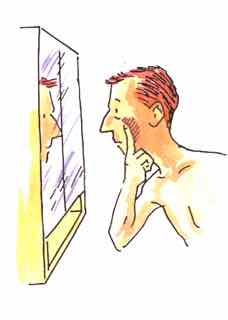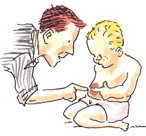Recognising acute atopic eczema flare-ups
Dr Peter Norén says: "The sooner an acute eczema flare-up is recognised, the better it can be treated!"
Early effective treatment of flare-ups will mean less and less trouble as convalescence procedes.
If triggers are known and can be avoided, a flare-up may not happen: otherwise, having available optimal topical treatment will mean as soon as a flare-up is identified, it can be successfully treated in a few days only - and without habit reversal.

There are four features of acute inflammation to watch out for:
1) Dryness - an increase in dryness is both a trigger factor and an early feature of inflammation.
2) Itchiness - itchiness may signal a need for increased frequency of emollient, but it is also an early indicator of inflammation.
3) Redness - or erythema, which is the main feature of acute inflammation. With pale skin the shade of redness is relatively bright and distinct. With skin of colour acute inflammation can have a less distinct, darker more purple shade of red. In all cases of erythema firm touch pressure on the surface of the affected skin will diminish the colour change - see below.*
4) Roughness - as the inflammation progresses the affected skin swells and feels rough to touch.
NB:
- The roughness of acute eczema is different to that of chronic eczema, where the skin becomes thickened by lichenification, a process of skin overactivity stimulated by regular scratching.
- *In skin of colour lichenification is associated with hyperpigmentation - firm touch pressure on the surface of the affected skin will not diminish this colour change.

As soon as a flare-up is noticed, treat it!
It only takes a few days!
